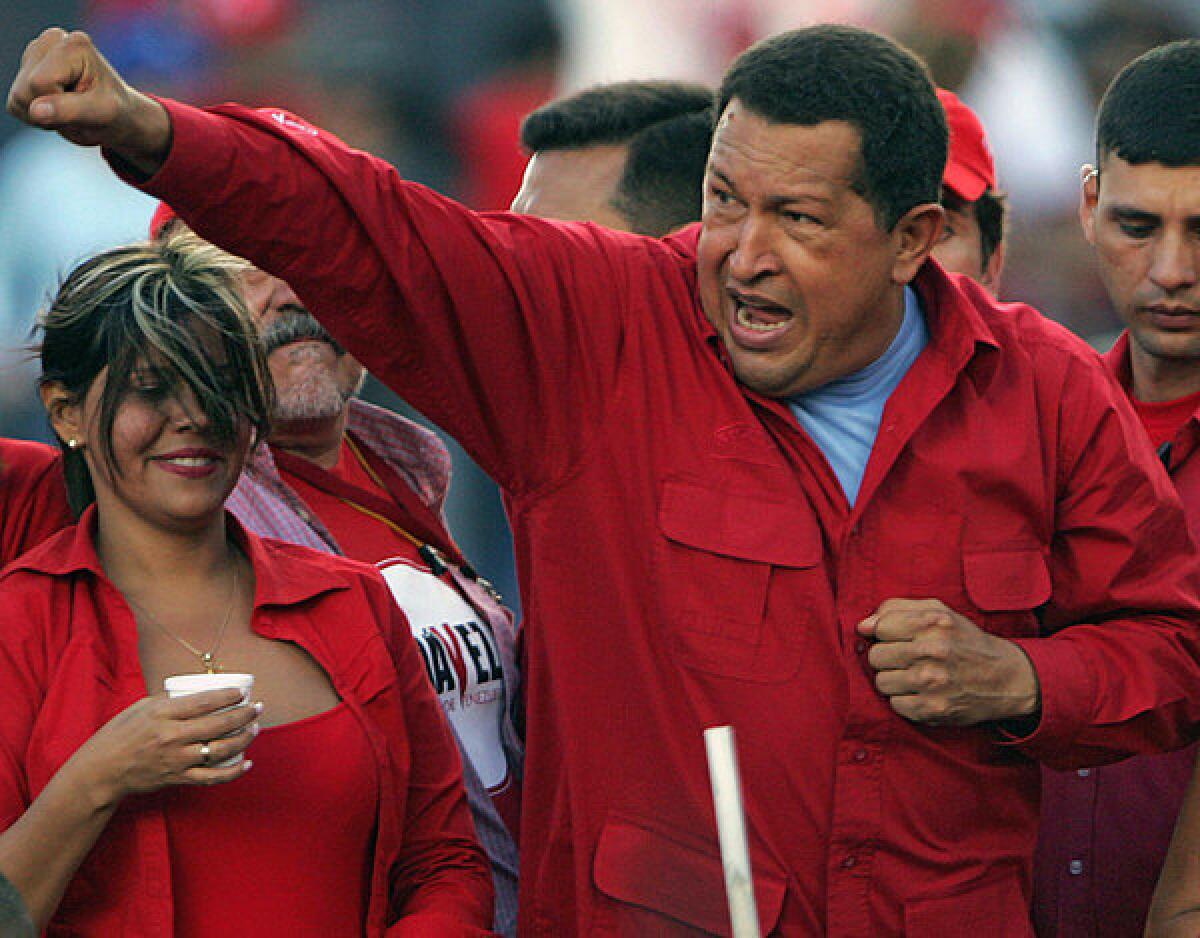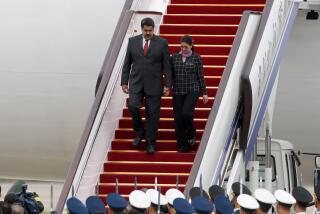Venezuela’s Hugo Chavez in his heyday: A look at ‘el comandante’

At midnight, Hugo Chavez and his entourage swept into the hotel lobby, transforming the drab venue in chilly, high-altitude La Paz into a sizzling vortex of tropical verve and chavista vigor.
“Musicos!” the Venezuelan president declared upon spotting an Argentine combo. “Toca! Toca!” Play! Play!
The musicians dutifully grabbed their instruments and “el comandante” belted out a pair of melancholic ballads in his booming baritone, delighting astonished hotel staff, journalists, guests and his own contingent of security guards and adoring aides.
PHOTOS: Hugo Chavez | 1954-2013
Chavez had gone to Bolivia in January 2006 to celebrate what he viewed as a personal triumph: the inauguration as president of his firebrand protege, Evo Morales, champion of the Andes’ coca farming underclass and implacable foe of U.S. efforts to curb cultivation of the leaf, the raw ingredient in cocaine.
Bolivia’s first indigenous president would be a formidable recruit to the former Venezuelan tank commander’s “anti-imperialist” front.
Chavez, who died Tuesday at age 58 after a long bout with cancer, was on a roll. And, in Washington, he had a central-casting worthy foil: George W. Bush, a Republican blue-blood whom Chavez would mock as “the devil,” “Mr. Danger,” and, later, “el caballerito,” the little gentleman. He accused the Bush administration of abetting a 2002 coup attempt in Caracas, though the U.S. denied any role.
The Bush era represented a kind of rhetorical heyday for Chavez. The Venezuelan’s idiosyncratic amalgam of Bolivarian socialism and anti-U.S. vitriol found adherents from Argentina to Nicaragua. Chavez repeatedly invoked revolutionary icons, the likes of Fidel Castro and Ernesto “Che” Guevara.
“I was just on the telephone with Fidel,” Chavez would tell his audiences, imparting the latest bits of news, gossip and wisdom from the aging survivor of CIA plots that included poisoned cigars and booby-trapped conch shells.
The Venezuelan reveled in reviving the Cold War narrative pitting an “imperial” Uncle Sam against a valiant pueblo.
“Donde esta el Che?” Chavez asked rhetorically of a smitten crowd in November 2005 at a Summit of the Americas in Mar del Plata, Argentina, referring to the Argentine native son who rose from genteel origins to become a transcendent insurgent brand, his image glowering from countless T-shirts and posters.
Chavez arrived to the summit in characteristically theatrical fashion, aboard a chartered train also ferrying Bolivia’s Morales and Diego Maradona, the soccer immortal from the shantytowns who had become an ardent chavista, bearing tattoos of both Guevara and Castro on his thick frame.
In Mar del Plata, Chavez joined forces with Argentine President Nestor Kirchner and other left-leaning leaders to scuttle a Bush administration hemispheric trade initiative. An irritated Bush ultimately left the summit defeated, to the chortling delight of the Chavez bloc.
In truth, Chavez’s bombast often turned off his Latin American counterparts, even those with much longer histories on the left than the military man turned populist politician.
Former Brazilian President Luiz Ignacio da Silva, a one-time factory worker and union leader, pursued a path of popular social welfare policies with fiscal discipline and cordial relations with Washington. Pragmatism and the art of compromise had eclipsed some of Lula’s youthful revolutionary fervor.
“If Jesus Christ came here, and Judas had votes in any party,” Lula once told an interviewer, “Jesus would have to make a coalition with Judas.”
But Chavez wasn’t tempted to reconcile with an adversary who he once famously proclaimed reeked of sulfur.
In 2007, as part of an anti-Chavez charm offensive, Bush visited Brazil and Uruguay, nations whose leaders had impeccable leftist pedigrees but were also keen to bolster trade with the United States.
In Uruguay, Bush even sat down for a ranch barbecue with Jose “Pepe” Mujica, a “Dirty War” torture survivor and former urban guerrilla with the communist Tupamaros.
“Negotiating is not selling one’s soul or changing one’s ideas,” Mujica, who would later become Uruguay’s president, told the Argentine daily Clarin.
Across the River Plate in Buenos Aires, Chavez stood center stage in a soccer stadium denouncing the “imperial” excursion and labeling Bush “a political cadaver.”
PHOTOS: Hugo Chavez | 1954-2013
By then, the White House had learned not to respond to Chavez’s verbal provocations, a strategy continued by President Obama — who, for Chavez, represented a much more complex target than Bush.
Chavez lobbed some insults Obama’s way, labeling him a “clown” after Obama had questioned Caracas’ close ties to Cuba and Iran. But even the scrappy Chavez seemed to see diminishing returns in polemical broadsides.
“I hope this doesn’t harm Obama, but if I was from the United States I’d vote for Obama,” Chavez told state television last September, Reuters reported, at a time when both presidents were facing tight reelection battles.
“With the extreme right defeated here and there, I hope we could start a new period of normal relations with the United States.”
ALSO:
Funeral begins for Venezuela’s Chavez
Cardinals will begin voting on new pope Tuesday
Hagel arrives in Afghanistan for first visit as defense chief
Times Beirut bureau chief McDonnell was Times bureau chief in Buenos Aires from 2005 to 2008.
Special correspondents Andres D’Alessandro in Buenos Aires and Marcelo Soares in Sao Paulo, Brazil, contributed to this report.
More to Read
Sign up for Essential California
The most important California stories and recommendations in your inbox every morning.
You may occasionally receive promotional content from the Los Angeles Times.









